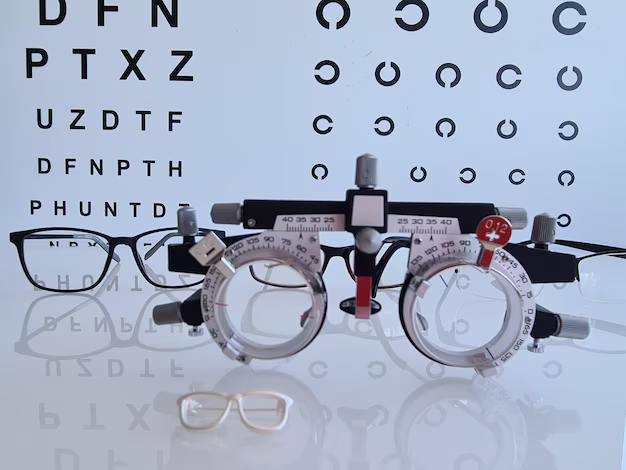Your Guide to Can Glasses Help Cataracts
What You Get:
Free Guide
Free, helpful information about Cataract FAQ and related Can Glasses Help Cataracts topics.
Helpful Information
Get clear and easy-to-understand details about Can Glasses Help Cataracts topics and resources.
Personalized Offers
Answer a few optional questions to receive offers or information related to Cataract FAQ. The survey is optional and not required to access your free guide.
Can Wearing Glasses Improve Cataract Symptoms?
Imagine looking through a foggy window and struggling to see the world with clarity. This is how many people describe living with cataracts. As common as they are, cataracts can significantly impact daily life by making simple tasks like reading and driving difficult. If you're reading this, you're probably wondering if wearing glasses can mitigate this issue. Let's dive deep into understanding cataracts and whether glasses can offer any help.
🌟 Understanding Cataracts: More Than Just Cloudy Vision
What Are Cataracts?
Cataracts involve the clouding of the eye's natural lens, leading to decreased vision. They develop gradually and are often linked to aging. While cataracts are most common in older populations, anyone, even children, can develop them due to various factors such as genetic conditions or eye injuries.
Symptoms of Cataracts
Cataracts can manifest through a variety of symptoms, including:
- Blurry or foggy vision
- Sensitivity to light or glare
- Difficulty seeing at night
- Fading or yellowing of colors
- Frequent changes in eyeglass prescription
Causes and Risk Factors
Age is a primary factor, but other risks include:
- Genetics: A family history of cataracts can increase your chances.
- Health Conditions: Diabetes, hypertension, or previous eye inflammation can contribute to cataract development.
- Lifestyle: Smoking, excessive sun exposure, and poor nutrition may accelerate cataract formation.
🕶️ Can Glasses Help in Managing Cataracts?
The Role of Glasses in Cataract Management
When cataracts begin to develop, vision changes can often be managed with prescription glasses. These glasses might not reverse the cataract but can help sharpen vision by correcting refractive errors that accompany cataracts.
Key Benefits of Glasses for Cataracts:
- Enhanced Focus: Prescription lenses can improve clarity by optimizing the focus.
- Reduced Glare: Anti-reflective coatings on glasses can minimize glare sensitivity.
- Managed Astigmatism: Correct lenses can address astigmatism, offering clearer vision even with mild cataracts.
When Glasses Might Not Suffice
As cataracts progress, their impact on vision becomes more significant, and glasses may no longer be sufficient. At this stage, assistance from eyeglasses might diminish, and cataract surgery becomes a more viable solution. Surgery is typically recommended when cataracts severely hinder daily activities.
🧑⚕️ Cataract Surgery: A Proven Solution
When to Consider Surgery
Cataract surgery is generally considered when:
- Vision loss interferes with everyday activities such as reading, driving, or watching TV.
- Non-surgical interventions (like glasses) don't provide adequate vision improvement.
What Does the Surgery Involve?
Cataract surgery is a common and generally safe procedure. It involves removing the clouded lens and replacing it with a clear artificial lens. Here are some expectations:
- Procedure Time: Usually lasts about 15-30 minutes.
- Recovery: Most people resume normal activities within days.
- Outcomes: High success rate with significant improvement in vision for most patients.
🔍 Exploring Non-Surgical Options If Surgery Isn't Yet Necessary
Lifestyle Adjustments
If surgery isn't immediately necessary, consider these lifestyle changes to manage cataract symptoms:
- Brighter Lighting: Use brighter lights for activities like reading to help reduce eye strain.
- Sunglasses: Wear UV-protection sunglasses to decrease light sensitivity.
- Magnifying Lenses: For reading or detailed work, magnifying lenses can enhance visibility.
Monitoring and Regular Check-Ups
Regular eye check-ups are crucial for monitoring cataract progression. Your eye-care professional can guide when glasses are sufficient or when surgery might be necessary.
📝 Key Takeaways for Managing Cataracts
- Glasses Can Help: For early-stage cataracts, glasses can enhance vision and manage some symptoms.
- Surgical Intervention: Cataract surgery remains the definitive method for treatment when vision impairment becomes significant.
- Lifestyle Considerations: Managing light exposure and using magnification tools can aid in dealing with daily challenges.
- Regular Eye Exams: Staying updated with regular exams ensures timely intervention as cataracts progress.
🌟 Quick Reference Guide 🌟
- 👁️ Symptoms: Blurry vision, sensitivity to glare, difficulty in low light.
- 🕶️ Glasses Help: Enhance focus, reduce glare sensitivity, and manage astigmatism.
- 🔄 Surgery: Necessary when daily life is impacted; it has a high success rate.
- 📅 Lifestyle Tips: Brighter lighting, UV-protection sunglasses, and routine eye exams can support day-to-day activities.
Understanding cataracts and the role of glasses can empower you to make informed decisions about your eye health. Whether glasses suffice for your needs or surgery becomes the chosen path, appreciating these aspects helps demystify this common, yet impactful, vision condition. 🌟
What You Get:
Free Cataract FAQ Guide
Free, helpful information about Can Glasses Help Cataracts and related resources.

Helpful Information
Get clear, easy-to-understand details about Can Glasses Help Cataracts topics.

Optional Personalized Offers
Answer a few optional questions to see offers or information related to Cataract FAQ. Participation is not required to get your free guide.


